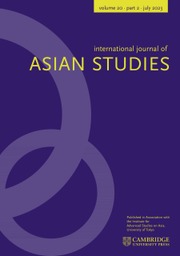Article contents
CONSTRUCTING CULTURAL DIFFERENCE IN MANCHUKUO: STORIES OF GU DING AND USHIJIMA HARUKO
Published online by Cambridge University Press: 20 June 2013
Abstract
This article explores the role of Pan-Asian ideology in Japanese imperialism and how it is reflected in literary texts produced in Manchukuo. Through the analysis of Chinese and Japanese literary works this study examines the construction of ethnic identities and difference which was central to both Pan-Asian discourse and Manchukuo national identity. In both types of works the Japanese and Chinese characters use the concept of ethnicity or culture to reveal different realities of Manchukuo's ethnic politics. While the insoluble separation between the Japanese and the Chinese in Ushijima Haruko's “A Man Called Shuku” betrays the ethnic harmony proclaimed by the Manchukuo regime, Gu Ding's “A New Life” suggests a possibility of true harmony between the two ethnicities. Where the Japanese vice governor's distrust of his Chinese subordinate in Ushijima's story reflects the author's own fear and guilt about her privileged social position, the Chinese protagonist in Gu's story emphasizes the importance of Japanese modern medicine during a plague outbreak as well as his importance as a mediator between the colonizer and his countrymen in order to justify the author's association with Japanese imperialism.
- Type
- Research Article
- Information
- Copyright
- Copyright © Cambridge University Press 2013
References
REFERENCES
- 17
- Cited by


